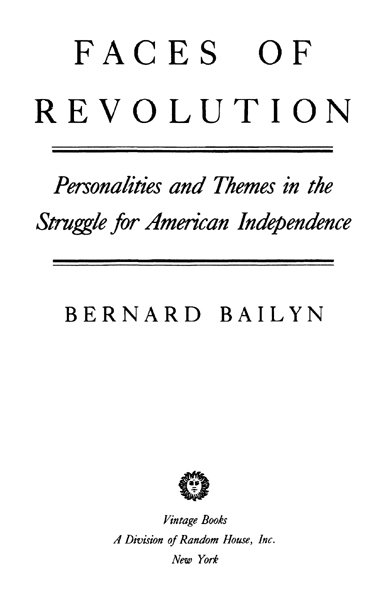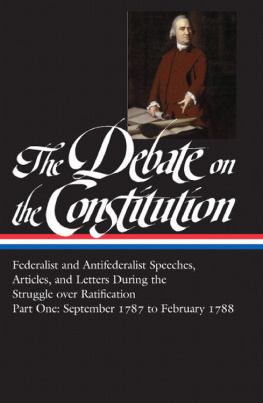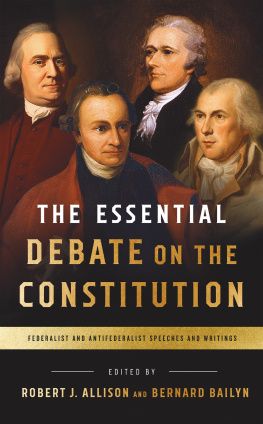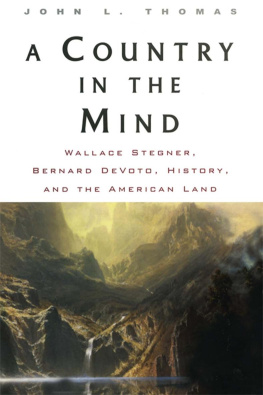Bernard Bailyn - Faces of Revolution: Personalities & Themes in the Struggle for American Independence
Here you can read online Bernard Bailyn - Faces of Revolution: Personalities & Themes in the Struggle for American Independence full text of the book (entire story) in english for free. Download pdf and epub, get meaning, cover and reviews about this ebook. year: 2011, publisher: Knopf Doubleday Publishing Group, genre: Art. Description of the work, (preface) as well as reviews are available. Best literature library LitArk.com created for fans of good reading and offers a wide selection of genres:
Romance novel
Science fiction
Adventure
Detective
Science
History
Home and family
Prose
Art
Politics
Computer
Non-fiction
Religion
Business
Children
Humor
Choose a favorite category and find really read worthwhile books. Enjoy immersion in the world of imagination, feel the emotions of the characters or learn something new for yourself, make an fascinating discovery.

- Book:Faces of Revolution: Personalities & Themes in the Struggle for American Independence
- Author:
- Publisher:Knopf Doubleday Publishing Group
- Genre:
- Year:2011
- Rating:4 / 5
- Favourites:Add to favourites
- Your mark:
- 80
- 1
- 2
- 3
- 4
- 5
Faces of Revolution: Personalities & Themes in the Struggle for American Independence: summary, description and annotation
We offer to read an annotation, description, summary or preface (depends on what the author of the book "Faces of Revolution: Personalities & Themes in the Struggle for American Independence" wrote himself). If you haven't found the necessary information about the book — write in the comments, we will try to find it.
Faces of Revolution: Personalities & Themes in the Struggle for American Independence — read online for free the complete book (whole text) full work
Below is the text of the book, divided by pages. System saving the place of the last page read, allows you to conveniently read the book "Faces of Revolution: Personalities & Themes in the Struggle for American Independence" online for free, without having to search again every time where you left off. Put a bookmark, and you can go to the page where you finished reading at any time.
Font size:
Interval:
Bookmark:

FACES OF REVOLUTION

Bernard Bailyn did his undergraduate work at Williams College and his graduate work at Harvard, where he has taught since 1949 and where, since 1981, he has been the Adams University Professor. His previous publications include The New England Merchants in the Seventeenth Century; The Origins of American Politics; Education in the Forming of American Society; Pamphlets of the American Revolution; The Ideological Origins of the American Revolution, which received the Pulitzer and Bancroft prizes in 1968; The Ordeal of Thomas Hutchinson, which won the 1975 National Book Award for History; The Peopling of British North America; and Voyagers to the West, which won the Pulitzer Prize in 1986.
OTHER BOOKS BY BERNARD BAILYN
Voyagers to the West
The Peopling of British North America
The Great Republic (co-author)
The Ordeal of Thomas Hutchinson
The Origins of American Politics
The Ideological Origins of the American Revolution
Education in the Forming of American Society
Massachusetts Shipping, 16971714 (with Lotte Bailyn)
The New England Merchants in the Seventeenth Century
Edited and Co-edited Works
The Apologia of Robert Keayne
Pamphlets of the American Revolution
The Intellectual Migration: Europe and America, 19301960
Law in American History
The Press and the American Revolution
Strangers Within the Realm: Cultural Margins
of the First British Empire

FIRST VINTAGE BOOKS EDITION, SEPTEMBER 1992
Copyright 1990 by Bernard Bailyn
All rights reserved under International and Pan-American Copyright Conventions. Published in the United States by Vintage Books, a division of Random House, Inc., New York, and simultaneously in Canada by Random House of Canada Limited, Toronto. Originally published in hardcover by Alfred A. Knopf, Inc., New York, in 1990.
Mind from Things of This World by Richard Wilbur, copyright 1956 by Harcourt Brace Jovanovich, Inc. and renewed 1984 by Richard Wilbur, reprinted by permission of the publisher.
Library of Congress Cataloging-in-Publication Data
Bailyn, Bernard.
Faces of revolution: personalities and themes in the struggle for American independence/Bernard Bailyn.1st Vintage Books ed.
p. cm.
Originally published: New York: Knopf:
Distributed by Random House, 1990.
eISBN: 978-0-307-79847-3
1. United StatesHistoryRevolution, 17751783.
2. United StatesHistoryRevolution, 17751783Biography.
3. United StatesBiography. I. Title.
[E208.B21992]
973.30922dc20
[B] 92-50101
v3.1
for
My Graduate Students
Past and Present
PERSONALITIES
It Is My Destiny to Dig Treasures with My Own Fingers
No American Should Come to Europe under 30 Years of Age
My Temper Does Not Incline to Enthusiasm
Prepare in Time an Asylum for Mankind
Oh the Villian!
It Is Possible We May Be Mistaken; Things May Appear Very Differently to Others As Upright As Ourselves
God Is My Witness, That from the Bottom of My Heart I Detest These Proceedings
There Arose a New King over Egypt, Which Knew Not Joseph
THEMES
A Year of ChallengeA World Transformed
When I began writing on the American Revolution many years ago I planned a series of personality sketches and interpretative essays to be published separately, as time permitted, and then, eventually, brought together as a unit. The pieces, according to the plan, would be carefully matched in subject matter, and so closely related to one another that certain episodes and ideas, even certain phrases, that appeared in one would reappear in others, but in different contexts, with the result that what would have seemed at first to be a casual collection of biographical and thematic sketches would in the end form in the readers mind an integrated and rounded picture. At certain angles of perception the various facesfacetsof the Revolution would reflect each other and deepen the perspective of the composition as a whole.
It was an ambitious plan, but many other projects intervened, and the occasions for writing the pieces required formats difficult to fit into the general pattern. Only two of the planned pieces (the first two in this volume, which originally had matching titles) were written precisely according to the original scheme. Yet the intent must have lodged itself in some vital lobe or other, for over the years I have come back again and again to the purpose that lay behind that scheme and have writtenno longer according to an intricate plan but to satisfy immediate commitmentspieces which in cruder ways come within at least the general boundaries of the book I had in mind. Personalities and ideas, even phrases, reappear in different contexts; themes are touched on, anticipated, in one essay and developed more fully in another; key issues are approached in one way in one essay, in another way in the next.
I wish these pieces, brought together in this volume, were closer to the original plan; I wish they could do all the things I originally hoped they would do. As it is, I shall be satisfied if they give some pleasure and information to readers interested in our origins as a nation, and if they convey clearly certain basic ideas.
I believe, in the first place, that there was nothing inevitable about the American Revolution. It did not need to happen, and as late as 1772 or 1773 the best-informed people of the time (Franklin, for example) thought it could be deflected. As I put it at one point ( in the present volume):
Deep flows of potentially revolutionary beliefs and apprehensions had moved through the delicate structure of mid-eighteenth-century American politics, but in the constitutional crisis of the 1770s there had been no necessity for these passionate concerns to break through the channels of civility. What was inevitablewhat no one could have restrainedwas Americas emergence into the modern world as a liberal, more or less democratic, and capitalist society. That would have happened in any case. But that this emergence took place as it didthat it was impelled forward by a peculiar ideological explosion generated within a society less traditional than any then known in the Western worldthis crucial fact has colored the whole of our subsequent history, and not only our own, but the worlds.
The implications, I think, are important. While there were deep forces at work which in time would have led inescapably to a greater and greater attenuation of Anglo-American political relations until the connection became mere friendly cooperation, the fact that the break was violent and revolutionary meant that in important ways it was the product of human decision and of the impact of personalities and ideas upon the events of the time. During the years of disruption it therefore mattered who was in charge, who led the struggle, and who led the opposition to it; it mattered what kinds of people they were, what patterns of personal responses they brought to the public life of their time. Above all, it mattered what they believed, what motivated them, how they perceived the world and the events in which they participated. No one can understand why there was a revolution, what kind of a revolution it was, and what consequences it had, without some sense of the personalities involved and some sense, too, of the complex relationship among personalities, ideas, and events. In seven of the chapters I have attempted to explore this problem with respect to four major figures (Thomas Jefferson, John Adams, Thomas Hutchinson, and Thomas Paine) and three minor personalities (Jonathan Mayhew, Andrew Eliot, and Stephen Johnson, whose careers illustrate particularly well the role of religion in the Revolutionary movement).
Font size:
Interval:
Bookmark:
Similar books «Faces of Revolution: Personalities & Themes in the Struggle for American Independence»
Look at similar books to Faces of Revolution: Personalities & Themes in the Struggle for American Independence. We have selected literature similar in name and meaning in the hope of providing readers with more options to find new, interesting, not yet read works.
Discussion, reviews of the book Faces of Revolution: Personalities & Themes in the Struggle for American Independence and just readers' own opinions. Leave your comments, write what you think about the work, its meaning or the main characters. Specify what exactly you liked and what you didn't like, and why you think so.





